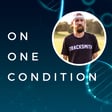Introduction to 'On One Condition' Podcast
00:00:00
Speaker
Hi, I'm Sylvain Berthelot and you're listening to On One Condition, a podcast to raise awareness about health conditions by listening to people who live them every day.
Barbara Williamson's Battle with Sepsis
00:00:11
Speaker
My guest today is Barbara Williamson and we're going to talk about sepsis.
00:00:18
Speaker
Hi Barbara, thanks for joining me. How are you doing? Hi Sylvain, I'm fine, thank you. Thanks for having me. Well, it's a pleasure. And as you know, I love starting with a
Connection to Music and Hospital Experience
00:00:32
Speaker
song. So would you be able to tell us which song you chose and why?
00:00:36
Speaker
Yeah, the song is called Battle. and The artist Wookiee. I found that after, you know, seven months in hospital, it did feel like a battle.
00:00:48
Speaker
And ah the words resonate with me because, you know, a lot of people were praying for me. And it was a battle that I... feel that I have overcome. um And every day, on the lyrics every day, you get in the saddle and then faith will bring you home.
00:01:05
Speaker
So, yeah, I think, you know, with a lot of prayers and, you know, believing in the view of the power of prayer, it's definitely brought me home. Amazing.
00:01:17
Speaker
I discovered that song thanks to you and I really like it. So thank you for sharing. And you've mentioned many things that we'll go back to as you share your story.
Health Issues During COVID: Heartburn to Tumor Discovery
00:01:31
Speaker
So we're talking about sepsis, but essentially it didn't start with sepsis. So where did this battle start for you? Right. Okay.
00:01:43
Speaker
So first of all, I, well, it started by a heartburn, what I thought was heartburn. And, you know, it was going on for quite a few months. and Doctors were treating me with Gaviscon.
00:01:58
Speaker
um It was around sort of the time where it was COVID, that sort of time, like 2021, sort of when it was just, we were just kind of like nearly coming out of COVID.
00:02:11
Speaker
So you couldn't really go into the surgery. you had to have a phone call from the doctor. So I was having, you know, this heartburn and it was getting back worse and worse. ah The Gaviscon wasn't doing anything and I had the call from the doctor. I'd like to wait for about a month, call this call from the doctor.
00:02:31
Speaker
and The day before I wasn't feeling very well at all. And the doctor says, and get to the hospital. So got to the hospital, me being the Girl Scout, packed a bag just in case,
00:02:43
Speaker
I had to stay in.
Chemo, Stem Cell Transplant, and Induced Coma
00:02:44
Speaker
um I did have to stay in after tests that they were doing. and Went for a scan and they discovered that I had a tumour, which, yeah, it was a bit shocking because it's, you know, just a thing that just thought, no, you know, this sort of thing would never happen to me. But yeah, I had a tumour and this was 2021. In 2022,
00:03:10
Speaker
and They said that they were going to do it by keyhole. But by the time diagnosed in September of 21 and then the operation 22, it had grown to the size of a golf ball.
00:03:23
Speaker
ah So I had the operation. Everything was benign. ah So that was great. ah So they decided to do a scan which picked up multiple myeloma, which is a bone marrow blood cancer.
00:03:40
Speaker
So the consultant said, you know, to go through the whole process of having a chemotherapy and stem cell transplant.
00:03:53
Speaker
So in September of 22, I went into a hospital having had months of chemotherapy.
00:04:04
Speaker
It was a new chemotherapy that they were trialing me on. um So... You know, you just go ahead with what they say, sign all the paperwork and everything.
00:04:15
Speaker
And I was told that I would be in hospital for about three weeks um following the strong dose chemo and stem cell transplant.
00:04:27
Speaker
So about a week after i was in hospital, after the transplant, I wasn't feeling very well. I had severe pains in my stomach, didn't know what it was or anything.
00:04:39
Speaker
told the nurses and it was time for me to have like a routine blood pressure check. and So they the nurse did the blood pressure check on the machine, nothing came up, no pressure or anything.
00:04:57
Speaker
she tried She said that the machines were bit temperamental so she'd try another one. and Nothing was reading on the other machine. and Then she called another nurse to get one of the, well, she told them what was going on and to get one of the old style, blood pressure machines, like what you'd have at home, saying old style, what you'd have at home.
00:05:19
Speaker
Tried it on that one. And I just remember being in the bed and the nurses looking at each other. And one of the nurses had just pressed the buzzer on the wall. And I just remember everybody just coming, running towards me.
00:05:32
Speaker
And that was about, that was it. Um, so I was put in a induced coma. ah for about two, two half weeks. Wow. Yeah.
00:05:43
Speaker
So, okay, so you had tumour in your stomach. Yeah. Then they discovered the yeah blood cancer. Mm-hmm.
00:05:54
Speaker
And the so the chemo and stem cell put you under... Like a situation that led the hospital to put you in a coma.
00:06:06
Speaker
Yeah. do you know so Do you know why they had to put
Critical Sepsis Diagnosis and Coma Dreams
00:06:10
Speaker
you in a coma? No, because obviously I was out, you know, I didn't know, you didn't know what was going on.
00:06:18
Speaker
That was the last thing I remember when the nurse pressed the buzzer and the doctors, you know, they all came running to me. But they didn't know that it was sepsis straight away. This is what, you know, my daughter was telling me that because my feet were going black and they were just, you know, didn't know what was going on.
00:06:39
Speaker
So it wasn't sort of till later on, you know, as the weeks went on, you know, as the week went on, obviously it seemed like I was up, you know, for a long time, but was only sort of within a couple of weeks.
00:06:52
Speaker
They realised that it was sepsis, but they, I was being pumped with sort of fluids and antibiotics. um So I believe, you know, obviously the reaction was quick, but they didn't know what they were, that it was sexist at that time.
00:07:08
Speaker
Yeah. Wow. that's I don't really understand how they put you in in a coma without you really knowing it. Yeah. Considering you were, i assume you were conscious at the time. Is that right?
00:07:24
Speaker
Yeah. well Well, I would have been and because all I, you know, remember is the, just having severe stomachache, but the mustard and the nurse pressing the buzzer, that's all I remember.
00:07:37
Speaker
Like the bit in between is just like a ah blur until I woke up. And so, first of all, if you don't mind me asking, do you have any memory of being in a coma?
00:07:52
Speaker
oh Well, last I just sort of had weird dreams. just but There's one that, you know, stands out vividly, and where I was near a church in Nottingham.
00:08:05
Speaker
It's a church that I'm very familiar with. i was outside the church, but there was quite a lot going on. And there was it was nursing, like awards for nurses that was going out at the church.
00:08:19
Speaker
But I was outside. And I remember there were some of my colleagues where I used to work. I worked in the funeral industry for 33 years. So but some of my colleagues were there in in this dream.
00:08:31
Speaker
And I just remember like walking towards one of my colleagues just to say hello. am my And my feet would turn to sand. They would just disintegrate to my knees. And I'd get up again and try to get to them. And my feet would just disintegrate. It was just really weird dream.
00:08:50
Speaker
But I'd get up again, just keep getting up. And there was another dream that i had. i was It was like i was in... like floating on an iceberg and there were like big, like white bears in the dream. It's just really weird. And there's just water sort of floating I was just there just, and I, and I dreamt that I was convinced that went home, but visited like this family, people that I didn't know, but I was convinced that I went home, but was in a coma. Yeah.
00:09:21
Speaker
radio It was really weird. Yeah. so So then the the hospital staff realized that you had sepsis. Yeah. Were you awake at that time or were you still in
Family's Vigil and Barbara's Recovery
00:09:34
Speaker
Well, I was in a coma. I was still in a coma. You know, people you sort came to say goodbye. But I managed to pull through.
00:09:47
Speaker
they said they just don't know how I managed to pull through from what I was going through. But my when I saw my feet, they were filled with fluid. And, you know, that the they look awful.
00:10:02
Speaker
They just reminded me when, you know, i was looking at my feet because they they started, they were filled with fluid and they just started to dry out over days and weeks. And it just reminded me of when I used to work in the funeral industry.
00:10:17
Speaker
And, you know, we used to have corpuses that were you know, and that had been found, you know, after, you know, months and they were just dried out. That's what it reminded me of, my feet, to my ankles.
Reflecting on Sepsis and Infection Sources
00:10:33
Speaker
You know, when they told me that was going to have my ab mutation, it was just quite brutal, really. and That was the last thing that i thought that I would be told.
00:10:46
Speaker
Still, like, not understanding sepsis or what sepsis was. Yeah. So do you know what led to sepsis then? Have they confirmed that it was an an infection? Yes, well, it was an infection. But sort of going back, when I was admitted to the ward, ah the person that admitted me said that this ward has a lot of infection. It was high in infection.
00:11:15
Speaker
And I just thought to myself, well, ah they did sort of tell me when I have the chemotherapy, my immune system will be very, very low. And then I'm being told that this ward is sort of rife with infection.
00:11:29
Speaker
I was left in this room, so alone, knowing that I was going to have my transplant, you know, the following day. And I just, you know, I don't know whether i got an infection through chemotherapy. I'm still not 100% sure, or whether it was like from the ward or the room that I was in, they said that, you know, they have the doors that sort of close and they'd trap anything, you know, in the special, it was a special room that I was in, and but they couldn't guarantee like a hundred percent that any infection could, you know, come into the room or anything.
00:12:05
Speaker
i I just don't know. And, you know, to know the fact that they didn't know that it was sexist sort of straight away, it does baffle me. and You know, the so the signs were there like low blood pressure.
00:12:19
Speaker
You know, I had chronic pains in my stomach. and Yeah. So, you know, I'm i'm not medically, you know, sort trained or anything like that. You just kind of go off, you know, what they say.
00:12:32
Speaker
Yeah. Yeah. And I guess they were, like you said, they were not necessarily expecting you to come out of the coma. So yeah. Yeah. You said that people came to say their goodbyes to you. Yeah. Yeah. People actually came to say goodbye.
00:12:49
Speaker
You know, my poor daughter, God knows how she, you know, she would have felt, my partner you know, family, you know, around me. can't, from the outside looking at it, I can't imagine how, like me being here now, I still can't get sort of get my head around how life would have been without me. You know what mean? Yeah.
00:13:15
Speaker
Yeah. Well, thankfully, you can think like that and and be on the other side actually thinking.
Facing Double Leg Amputation: Emotional Impact
00:13:23
Speaker
So that's that's very nice. So they told you that you had to go through double amputation.
00:13:32
Speaker
Yeah, yeah. how How did you feel about that? Well, I wasn't prepared for it because I was in the hope of I would actually, you know, walk again.
00:13:44
Speaker
even though, you know, looking at my feet in the state that they were in, i could move my toes to a certain point and then eventually that stopped. um But for the consultant to, you know, come into my room, there's a few of them are around my bed, tell me, um you're going to have to have your legs amputated.
00:14:08
Speaker
i was just, see I don't know, I was just thinking now I was in a dream, I was like, Sorry, seriously? yes you're going to have to have your legs amputated. out I just thought that was it like you know, like my world was going to be over because you need your legs. i just It was just like I'd lost somebody.
00:14:30
Speaker
That's how it felt, just to be told, just like that. You know, I was just, you know, supposed to be in the hospital three weeks and then come home, you know, enjoy life. But to be told, you're going to have to have your legs amputated.
00:14:45
Speaker
It was just hard to take in. Yeah. Yeah. can imagine. And how long did it take between them telling you and when they did it?
00:14:56
Speaker
Yeah. So they told me, think it was about the October of 22, October, November. And then I had my amputation March 23. Yeah.
00:15:09
Speaker
So I was in hospital for seven months. Wow. Yeah. Why did it take so long? Well, I had other complications in between. and i was having problems with my stomach and they were giving me Gaviscon. Gaviscon always seems to pop up my life, I'm not doing anything.
00:15:29
Speaker
and So they gave me Gaviscon. My stomach was like swelling. The pain was vile. and It was just swelling and swelling. was about three three, four weeks in. but The consults come around your bed every morning,
00:15:43
Speaker
seeing you're doing and whatever. And I just says, I cannot take this pain anymore. And the following day, they told me I was going down for emergency surgery and my bowels actually knitted together.
00:15:55
Speaker
So I had to have another, had to have a nine hour operation to unpick my bowel. And then I ended up with a stoma bag as well. Okay, so it wasn't intentional to make you wait that long. It's just that they had to deal with other conditions.
00:16:12
Speaker
And do you know if that was linked to the sepsis at all or was it something else? Well, they do say you can have you know so of chronic pains in your stomach.
00:16:24
Speaker
And it might have been whether you know i was carried there was an infection from whether the dose of the chemotherapy that didn't agree with me which led to me having this problem with my bowel and then you know it's all linked together. So you know having the sepsis and then having this operation on my stomach, it was just never ending, literally.
Hospital Isolation and Mental Health Challenges
00:16:51
Speaker
What did you do then at the hospital? Because I can imagine that time must be very long yeah when you're on your own. But then especially when you when you know that you your legs need to be amputated, that must be such a difficult situation to be in.
00:17:09
Speaker
Yeah, very difficult. Well, I felt personally like I was the only person that would that was having or that would have had an amputation.
00:17:20
Speaker
That's how I felt like i was the only person in the hospital that had sepsis, the only person in the hospital that was, you know, going to be a double amputee. And it was really hard. It was hard.
00:17:33
Speaker
I literally didn't, I was trying, you know, trying to imagine life, how it would be with me, you know, that was, you know, quite outgoing and bubbly and I didn't want to, like, lose that spot.
00:17:49
Speaker
And, you know, it also always said to me from day one, well, you got this. And that stuck in my head. I got this. And, you know, I was, thought, well, this is going to be the new me, you know, without legs.
00:18:04
Speaker
I've just got to carry on. Did you get any support from a mental health point of view from the hospital? Yes. Well, I did have...
00:18:17
Speaker
psychologists come in to speak to me a couple of times um but then you know you sort of got to know them and then they'd leave and then you got yeah and then you had to wait for somebody else for support and then they would go it just seemed to be like I started to sort of feel bit myself again and then they'd give you some support and then they'd leave but the person that did give me the most support was a lady called Helen.
00:18:49
Speaker
um She did pastoral care and she was amazing, absolutely amazing. You know, she she got me through. She really did get me through you know, prayers and everything. I do feel, you know, there is power in prayer more than ever now.
Physical Rehabilitation and Embracing New Abilities
00:19:10
Speaker
So then you got your amputation. Yeah, yeah. How was it then from from from then on? Yeah, well, it was it was hard to sort of look down the bed, knowing that when I went in, I could see, you know, sort of the length of my body.
00:19:30
Speaker
And then it was just sort of like, it seemed like it was half of me now. And the thought that, you know, i was on the operating operating table,
00:19:43
Speaker
And I could see my legs. And then all of a sudden I was sort of in bed with no legs, just stumps. And it was hard. But the day a couple of days after, they offered physio.
00:20:00
Speaker
And i was I just thought, well, I found the strength to sort of, you know, do physio two days in You know, I wasn't moving my knees.
00:20:18
Speaker
But, yeah, it was very hard. but Even now it's hard, but I'm here. I'm strong. I'm walking.
00:20:30
Speaker
Yeah. Yeah, yeah. So you're walking. That's amazing. Yeah. Lots of physiotherapy, lots of faith.
00:20:41
Speaker
I was determined to walk again and I wanted to walk tall and I wanted to dance again. Not that my dancing's great now, not that it was great before, but, you know, I love to listen to music and, yeah, it it just just feels great to be up standing and walking. So I started walking February worry last year. Yeah, and it just it just feels great just to not feel isolated, knowing that i can get up and I can go to the shops again and uh because I love to shop anyway and I can potter around and I'm not in the wheelchair yeah I just feel so strong and it feels so great and I feel so blessed I feel so blessed that's amazing yeah so did you have long in the wheelchair before you were able to walk again I was in my wheelchair say for about six months I'd say
00:21:40
Speaker
But yeah, I sort of ditched the wheelchair because I didn't want to rely. You know, a lot of people have given up, you know, or just think that they can't. But I was determined to say, yeah, I can.
00:21:54
Speaker
You know, anything's possible. You will walk again. I'm looking at, you know, my prosthetics and you kind of think, gosh, have I got to use those now?
00:22:04
Speaker
but these are my man new manual way, mode of transport. um I'm a bit slower, but I can walk. Yeah, I've done i've done a 1K walk already.
00:22:15
Speaker
did that last year, so that was amazing. Yeah, just feel blessed. I find that incredible, to if I'm honest, because we're we're at a time where there is so much,
00:22:32
Speaker
there to help people like you yeah carry on with life almost unchanged.
Resilience and Rejecting Disability Labels
00:22:41
Speaker
And tell me if you don't agree with this word unchanged, but the fact that you you can walk after losing both legs, it's it's incredible. Yeah.
00:22:54
Speaker
Yeah. Yeah. I don't look at myself as disabled and I look at the word disabled. And I picked the word able out and I'm able to walk.
00:23:06
Speaker
I'm able to do anything. I'm able to, you know, to be me again. And, you know, anybody sort going through this, you know, being an amputee. There's a lady that I used to go and see in the hospital and I thought I was the only the amputee in the whole hospital and she was only a couple of rooms down from me she had sepsis also and she lost both legs and both hands and you know I'm just so grateful to have my hands and she's you know she's doing amazing also but you know I just don't let it get to me you know there is life after sepsis um
00:23:58
Speaker
you know, and anything's, you know, still possible. And it it pushes you to you want to do more, and you know, sort define all, you know, objects that are put in front of you, hurdles that are put in front of you.
00:24:13
Speaker
and you just, you know, yeah, you can do this. You can, because anything is possible. And me personally, I got this, I got this. Yeah, yeah.
00:24:25
Speaker
I find that amazing, incredible. And but i feel it's it's a lot to do with your mindset as well. Yeah, definitely. So if you were to to see someone in the same situation as you, who's just been told that they have to get amputated, what would you tell
Advice on Identity Post-Amputation
00:24:46
Speaker
them? What what do you wish someone had told you?
00:24:50
Speaker
ah At the time, I wish somebody had told me. It's not the end of the world. It's not the end of the world. You know, don't let an amputation define you and get back to who you are or once were.
00:25:07
Speaker
You know, don't lose your sparkle. Don't lose spark because you can still do the same things that you did before. Yeah. You know, it might be just a little little bit different, but...
00:25:22
Speaker
You know, i can see you know that you can still we're nice trainers. I've got my Dolce & Gabbana trainers that I've walked in. I like my designs. So, yeah, because, you know, the last pair of shoes pair of shoes I walked in were Jimmy Choo shoes, the most expensive shoes that i ever bought, and I wore them once.
00:25:44
Speaker
And, ah you know, have them displayed in my dressing room. The first pair of trainers I walked in were my Dolce & Gabbana's. Oh, wow. So, yeah.
00:25:56
Speaker
But, you know, i used to love walking in the heels, but hopefully I will again. But for now, it's just sort trainers and flat shoes. But I'm walking. Do you find strength every day or are there days where you look at your legs and and and you still find it difficult to be positive?
00:26:20
Speaker
Yeah. Well, yes, I do have days where I look at my stumps, you know, my legs aren't there, but then ah look over at my prosthetics and think, well, they're my new legs now. Yeah.
00:26:36
Speaker
And i I put them on. i feel positive. I get up. I feel so strength. And I walk. I'm walking. So, you know, you just have to find that strength to say,
00:26:50
Speaker
you you can do this. Don't give up. Yeah. Yeah. Never give up. No, no. I think that's, that's very clear hearing from you that this is the, the mindset you need yeah Positive mindset. Yeah.
00:27:09
Speaker
Yeah. Positive. Definitely. Well, I have one last question for you, Barbara, which I love asking everyone.
00:27:20
Speaker
What's your happy place, a place where you feel at peace? Where I feel at peace?
Finding Peace and Imagination in Music
00:27:30
Speaker
Listening to music.
00:27:34
Speaker
Yeah, music is the food of love because you can lose yourself in music. Yeah. You can yeah listen to music. Yeah.
00:27:45
Speaker
I like that. And, you know, I've always wondered what what my happy place would be, because i I don't have to answer that question. I'm the one asking.
00:27:56
Speaker
But I think music is, yeah, that's something. Yeah. Well, can just sort of lose yourself and just forget about what's going on. Yeah. But my happy, happy place would be on a beach in Jamaica. Yeah.
00:28:10
Speaker
Oh, nice. Listen to the waves. Yeah. Looking at the white sandy beaches. Wow. I wish I could be there. Me too.
00:28:23
Speaker
Well, I found your story incredible and so so difficult. And I'm still scratching my head thinking, how did all this happen? But then hearing how positive you are.
00:28:41
Speaker
Mm-hmm. It's so so good to hear and and so important, I think, for people who are in the same situation as as you to hear that that's not the end and actually you can dance again. Definitely not the end. Definitely not the end. And you just you just feel blessed knowing how far you've come. Yeah. Yeah, because I've come a long way, a long way.
00:29:12
Speaker
you know, and yeah, with a positive mindset, anything's possible. You can get through it. You can get through it. Definitely.
00:29:25
Speaker
Well, I've written one word in big letters, strength. And I think that's the word I'll keep in mind yeah after our discussion.
00:29:36
Speaker
Yes. Strength. It's a strong word. Yeah. Yeah. Well, thank you so much, Barbara. It's been so nice talking to you. And yes, I'm sure your story will help a lot of people feel better about what they're going through.
00:29:53
Speaker
Thank you so much.




















